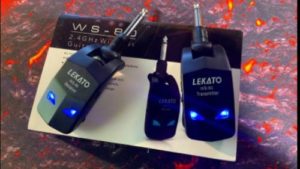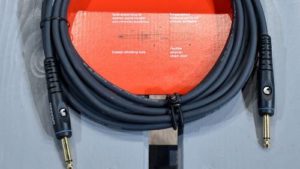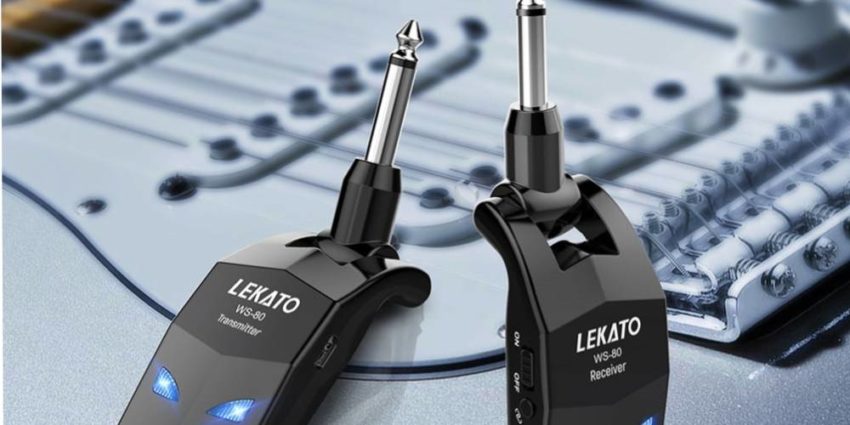I recently bought my first Lekato WS-80 Wireless Guitar System from Amazon. My guitar cable jack was becoming loose and I had to get a new one, and I came across this pretty cheap Wireless guitar system so I thought to myself, why not give it a try and I ordered one. After using it for a week now, I thought to share my experience using Guitar Wireless System with you all to answer the question: Are Wireless Guitar Systems good?
Wireless guitar Systems are more convenient and clutter free than the standard guitar cable, especially if you like playing guitar standing up and are particularly convenient for on-stage performances. Performance wise, they are neither better nor worse than the standard guitar cable.
Although guitar wireless systems have been around for a while now (Ken Schaffer invented the first Wireless Guitar System in 1976) but since they have become pretty affordable now, they are gaining popularity among seasoned and hobby guitarists. If you’d like to learn more about the Wireless Guitar Systems to see if they’re good for you, then continue reading as I’ll try to answer the most common questions people have regarding Wireless Guitar Systems.
How Does A Guitar Wireless System Work?
My wireless headphones, my laptop Mouse, my car audio system are all Bluetooth based wireless systems, therefore I was of the opinion that, like other wireless devices I have, Guitar Wireless Systems also use the Bluetooth Technology to transfer signals between the transmitter and the receiver. However, that’s not the case!
Wireless Guitar System uses Radio Frequencies for the transfer of signals between the transmitter and receiver. The most common frequency that guitar wireless systems use is the Ultra High Frequency (UHF) because it’s more stable, offering least interference and very low latency.
Do wireless guitar systems have latency?
 The wireless guitar system that I’ve purchased (Lekato WS-80) claims to have a signal range of upto 65feet but i practically experimented with it for upto 30 feet and did not feel any drop in signal strength or any sort of latency. I even tried going into a different room but didn’t get any latency.
The wireless guitar system that I’ve purchased (Lekato WS-80) claims to have a signal range of upto 65feet but i practically experimented with it for upto 30 feet and did not feel any drop in signal strength or any sort of latency. I even tried going into a different room but didn’t get any latency.
But this was when both, the transmitter and the receiver, were fully charged. For some reason, my receiver lost its charge earlier than the transmitter and started blinking (signalling a recharge is required). That’s when i felt some latency even at a distance of less than 5 feet and within the line of sight. So, with other factors, latency can also be affected by how charged the wireless system is.
When fully charged and within a range of less than 6 feet from the amp, I didn’t notice any latency at all and the wireless guitar system was as good as my guitar cable.
Now I’m talking about a guitar wireless system that cost me only $30 that is giving me less than 5ms latency (which is almost not noticeable, at least for a hobby guitarist like myself). I am sure if you buy higher-end guitar wireless systems like the ones made by Shure Music Company, you will feel no difference at all in the sound quality or latency when compared with the best guitar cables likes the ones made by Mogami Cables or D’Addario.
Do wireless guitar systems affect tone?
I use my Guitar Wireless System with my Fender Mustang I amp and use Audacity for recording. To my ears, the tone quality was exactly the same with the wireless system as it is when using a cable.
I did a little research regarding this and spoke to a couple of my friends who play for the local bands. I lent them my own wireless guitar system and 4 out of 5 guitarist friends claimed to find no change in tone. I also did a little research online and came across this article on Marshall’s website. As per the article, many professionals have said that there’s no difference in sound quality with either a guitar cable or a wireless guitar system as long as you have purchased a good quality product.
I’ve also seen many professional guitarists like Brian May using Wireless Guitar Systems in live settings, but I am sure the system they must be using would be a very high-end system.
What is difference between 2.4 GHz and 5.8 GHz for wireless guitar?
While searching for a Guitar Wireless System online, i frequently came across two types of systems; one running on 2.4GHz while the other on 5.8GHz and often 5.8GHz having a higher price range. As more is better, I thought of going with the wireless system having 5.8 GHz but it was a bit expensive for me, so I bought the one having 2.4GHz frequency. To understand the difference between the two, I spoke to a friend who is a telecom engineer working for AT&T. So What is difference between 2.4 GHz and 5.8 GHz for wireless guitar? this is what he has to say:
The main difference between 2.4GHz and 5.8GHz frequencies is that that the latter is faster than the former and because very few devices currently utilize 5.8GHz frequency. it is less crowded and hence you will find less interference if using a wireless guitar system having 5.8 GHz frequency. But if you’re playing guitar at home or a small place, a guitar wireless system with 2.4GHz frequency is also sufficient and you wont really have any noticeable difference between the two.
Wireless Guitar System Vs Guitar Cable
 It’s just been a week since I switched over to a wireless guitar system. Before that, I’ve used various guitar cables that include the cheap types as well as custom build guitar cables as well as some more expensive cables by D’Addario.
It’s just been a week since I switched over to a wireless guitar system. Before that, I’ve used various guitar cables that include the cheap types as well as custom build guitar cables as well as some more expensive cables by D’Addario.
Tone wise and latency wise, I honestly didnt feel any difference between a Guitar Wireless System and a guitar cable but I am just a hobby guitarist so if a professional guitarist wants to differ, they have all the rights to do so.
When it comes to convenience, I simply love what wireless guitar system has to offer. Not being bound by any cable, I can simply move around playing or practising my guitar on my Fender Mustang Amp. I am truly enjoying playing the guitar at a distance from my amp that actually, for some reason, enhances the tone for me. Perhaps it’s just a personal experience as I’ve always played guitar being very close to my amp and at a pretty low volume.
One thing that always turned me off were the different wires going to and from my guitar amp, like the AUX cable from my phone or laptop to the amp, the USB cable to connect my Fender Mustang Amp to Fender Fuse software on my laptop, sometimes the headphone cable when I practice at nights and then the guitar cable. All these cables made a huge mess. With the addition of Wireless Guitar System, I am able to at least remove the biggest cable which often used to get tangled with other wires.
The only drawback of using the wireless guitar system that I can think of until now is that I need to charge it on regular basis and although the company claims that the battery lasts for at least 8 hours, I dont think that’s true as I normally have to charge the system almost every other night. The good thing is that I dont need any specialized charger to charge my wireless guitar system and can easily do so with my regular phone charger or even my laptop because, like most other wireless guitar systems, mine also uses the standard phone USB cable and charger to charge and it usually takes an hour to fully charge.
Should I go wireless on guitar?
So, should you switch over to a wireless guitar system? As I didn’t find any difference in the quality of the tone, so for me, using the wireless guitar system is more of a personal preference and not really any improvement in the quality of my tone.
I specially opted for a wireless guitar system because it has now become pretty affordable and I was able to get it within the same price range as a good instrument cable. So I knew i wasn’t even paying anything extra just to connect my guitar with my amp.
I personally think that for electric guitar users, especially those who use stratocaster (because its connecter is in front and not on the side), the wireless guitar system might last longer as you can simply let it stay in your guitar and not constantly insert or remove it, that’s what used to mostly break my guitar cable connectors.
